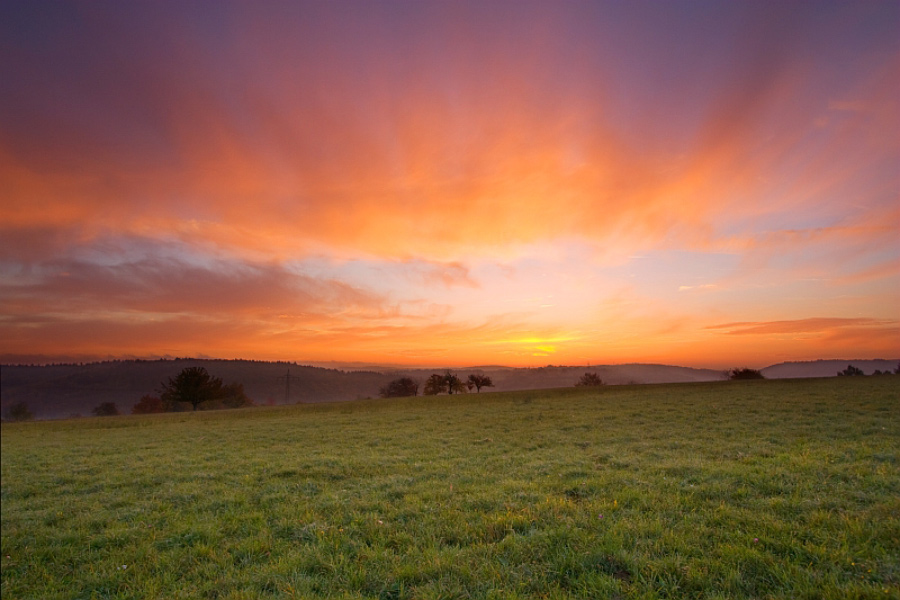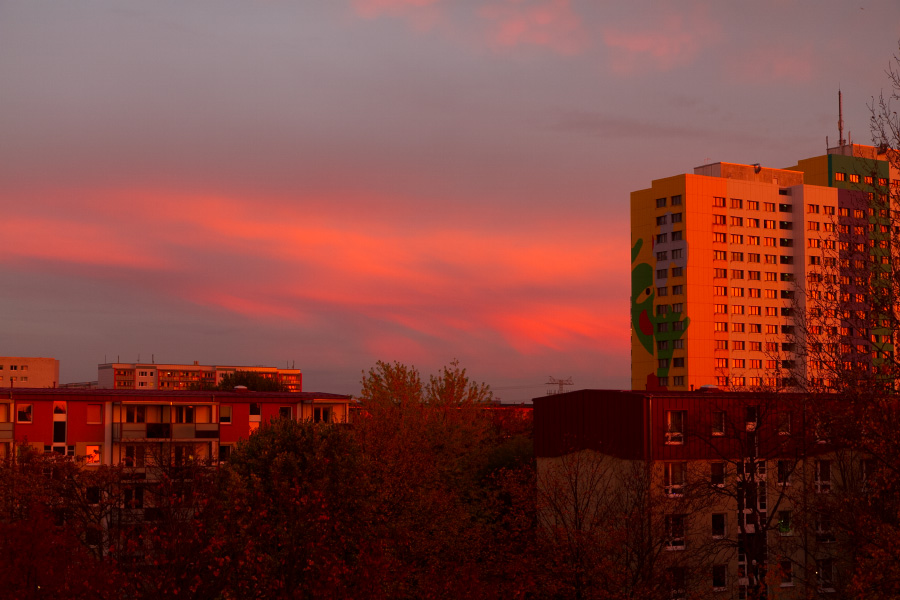Red sky in the morning, sailor's warning; red sky at night, sailor's delight.
This is one of the best-known weather sayings. In most cases, the saying is also true. At least when "red sky in the morning and evening" refers to the intense lighting of clouds by the setting or risen sun. In our latitudes, the weather is determined by westerly winds. A beautiful red sky at night can only occur if the sky in the west is clear and there are still many clouds in the east, e.g., from a departing precipitation area. During the night, the clouds move further east, often followed by a clear day. In the morning, it is exactly the opposite. The sun is in the east, where the sky still needs to be clear, but clouds are already approaching from the west. During the day, the clouds then cover the entire sky.
The red color of the clouds is due to sunlight being scattered by the various components of the atmosphere. On the one hand, air molecules scatter blue light more strongly than red. This results in the orange color of the sun at sunset. In order to create an intense red sky, many water droplets must also be present in the atmosphere. In addition to water droplets, dust particles (e.g., from a volcanic eruption) can also contribute to colorful twilight phenomena.
Explanation
History
Even in the Bible, dawn and dusk are interpreted: "In the evening you say: it will be a fine day, for the sky is red. And in the morning you say: It will be stormy today, for the sky is red and cloudy. You can judge the appearance of the sky; can you not discern the signs of the times?" (Matthew XVI, verses 2 and 3).
A brightly red evening sky was once seen as a sign of war, an ancient interpretation followed by, for example, Schiller:
In the sky, signs and wonders happen,
and from the clouds, blood red
The Lord hangs down the war cloak. In contrast, in antiquity, dusk was not seen as an omen of war. In Germanic mythology, dusk is considered a male giant active in the air, hostile to the blessing light spirits of the height: day and night fight each other in the battle, where dusk brings darkness over the sky and blocks the sun's rays from reaching the earth. The battle ends with the victory of the night spirits. In folklore, there are also much more pleasant associations with the sky colors. For example, evening or morning red means the baking of Christmas cookies by the Virgin Mary. Also interesting is an old Baden superstition, according to which frequent fires are expected after the dawn on New Year's Day. The connection between fire and red sky is naturally not far-fetched.
and from the clouds, blood red
The Lord hangs down the war cloak. In contrast, in antiquity, dusk was not seen as an omen of war. In Germanic mythology, dusk is considered a male giant active in the air, hostile to the blessing light spirits of the height: day and night fight each other in the battle, where dusk brings darkness over the sky and blocks the sun's rays from reaching the earth. The battle ends with the victory of the night spirits. In folklore, there are also much more pleasant associations with the sky colors. For example, evening or morning red means the baking of Christmas cookies by the Virgin Mary. Also interesting is an old Baden superstition, according to which frequent fires are expected after the dawn on New Year's Day. The connection between fire and red sky is naturally not far-fetched.
Weather Proverbs
- Red sky at morning on New Year's Day brings storms and great trouble.
- Red sky on low clouds will be followed by bad weather.
- The morning gray, the evening red, is a good weather sign.
- Good weather heralds red sky at night, but red sky in the morning brings wind and mud.
- Red sky in the morning fills the well, red sky at night dries it out.
- Red sky at night, good weather sign - red sky in the morning, bad weather threatens.
All these farming proverbs proclaim the still valid weather rule: Red sky at night brings good weather, because the clouds lit up in the east are usually remnants of a passing precipitation area. A red sky in the morning is the sign of an approaching cloud band from the west and is interpreted as a precursor of precipitation. If strong haze is added, precipitation often begins by midday.
Literature
The horizon has darkened,
Only here and there significantly sparkles
A red, foreboding glow;
Already bloody gleam the guns,
The rock, the forest, the atmosphere,
The whole sky gets involved
Only here and there significantly sparkles
A red, foreboding glow;
Already bloody gleam the guns,
The rock, the forest, the atmosphere,
The whole sky gets involved
[J. W. v. Goethe, Faust 2; 4th Act]

